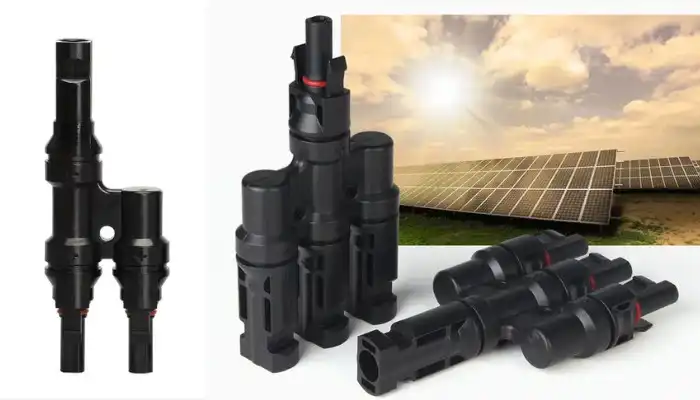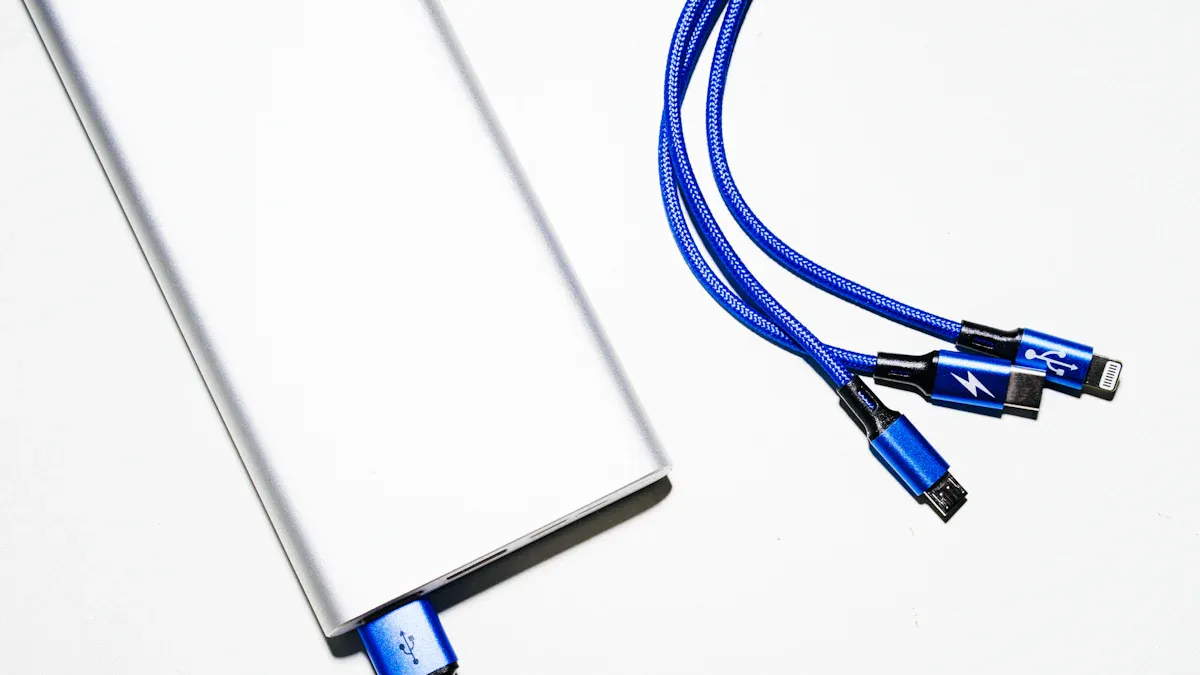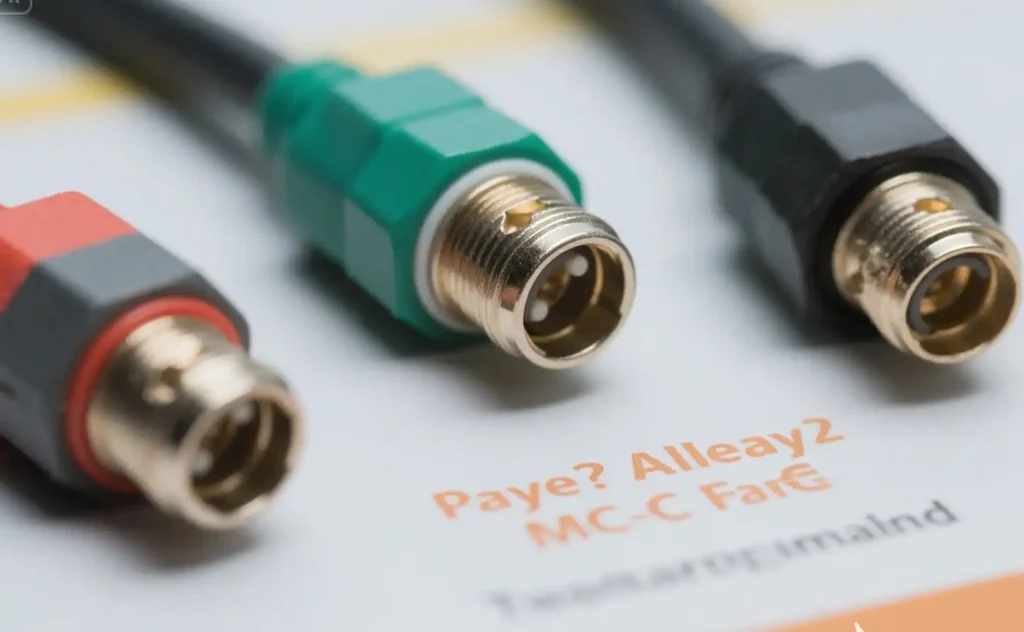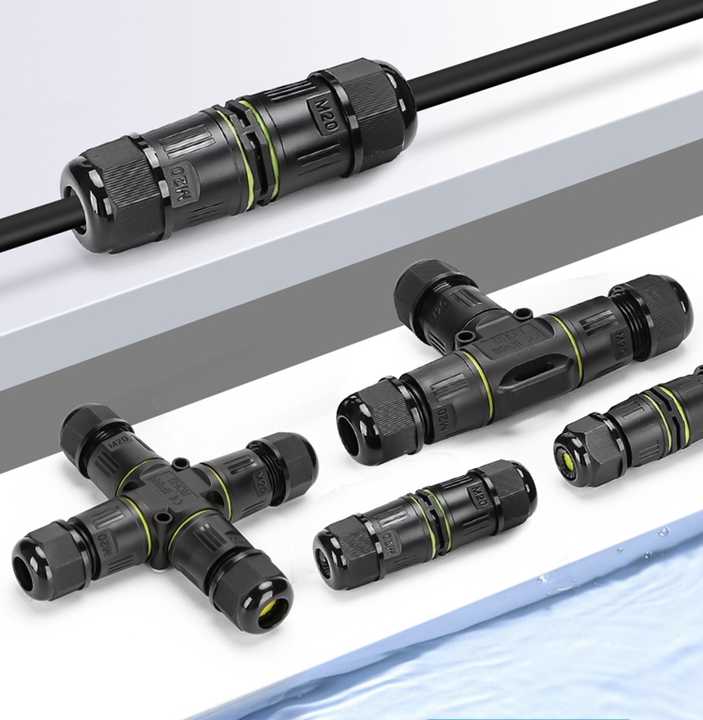Not all MC4 connectors are the same, even though they connect solar cables. Differences in design, compatibility, and quality can affect how well your solar system works. For example, heat tests show connector temperatures from 25°C to 95°C. This happens because some connectors are made better than others. Picking the right connector is very important for your system. Also, more people are using solar energy, especially in Asia Pacific. This means there is a bigger need for good MC4 connectors. Knowing these differences helps make your solar setup safer and work better.
Key Takeaways
-
MC4 connectors come in different designs and qualities. This can affect how well your solar system works. Pick carefully for safety and good performance.
-
Make sure the connectors match your solar panel’s cable size and voltage. If they don’t fit, it can cause overheating or damage.
-
Choose strong and certified MC4 connectors for better durability. Certifications like IEC and TÜV show they are safe and work well.
-
Think about what your solar system needs before picking connectors. Some setups need standard, branch, or adapter connectors.
-
Spending more on good MC4 connectors can save money later. They lower the chance of problems and repair costs.
What Are MC4 Connectors?

Purpose of MC4 electrical connectors
MC4 connectors are very important in solar power systems. They link solar cables to allow electricity to flow smoothly. These connectors are popular for 4mm solar wires because they work well and are easy to use. Their waterproof and dustproof design keeps cables safe, making them great for outdoor use in all weather. Whether for homes or businesses, MC4 connectors are a reliable and affordable choice.
A key feature of MC4 connectors is their compatibility. They fit 4mm and 6mm solar cables, making them useful for many setups. Using MC4 connectors helps your solar system run safely and efficiently, even in tough conditions.
Basic Design and Features
MC4 connectors are built to last and are easy to install. They are made from strong materials like copper, silver, and UV-resistant plastic. These materials help them handle bad weather like rain, snow, and strong sunlight. They also have an IP67 rating, meaning they are dustproof and water-resistant. This makes them perfect for outdoor solar setups.
Installing MC4 connectors is simple. They use a snap-lock system that connects cables securely without special tools. This plug-and-play design makes setup easy, even for beginners. They also have safety features, like a removal tool, to stop accidental unplugging.
Here’s a quick look at their main features:
|
Feature |
Description |
|---|---|
|
Voltage Rating |
1500V, works for modern solar systems. |
|
Robust Design |
Made with UV-resistant and durable materials. |
|
IP67 Protection |
Dustproof and water-resistant for outdoor use. |
|
Easy Installation |
Snap-lock design for simple setup. |
MC4 connectors come in male and female types to ensure correct connections. This design prevents reverse polarity and improves the safety of your solar system.
Types of MC4 Connectors

Standard MC4 Connectors
Standard MC4 connectors are the most used in solar systems. They connect solar panels safely and help power flow smoothly. These connectors are reliable and work well for homes and businesses.
Here are some main features of standard MC4 electrical connectors:
-
Electrical Performance: They handle up to 1000V DC and 30A current. This allows power to move efficiently with little energy loss.
-
Mechanical Properties: They have an IP67 waterproof rating. This means they can resist rain, dust, and extreme weather.
-
Reliability: These connectors are simple to use and rarely fail. This makes them a trusted choice for solar systems.
Standard MC4 connectors link single panels or groups of panels. Their strong design lasts long, even in tough conditions. If you’re building a solar system, these connectors are a smart and dependable option.
Branch Connectors
Branch connectors, or MC4 branch connectors, join multiple solar panels together. They make wiring easier by combining power from several panels into one circuit. These are important for bigger solar setups.
|
Feature |
Description |
|---|---|
|
Component Type |
Links many solar panels into one system. |
|
Installation |
Easy to use and connects quickly to other parts. |
|
Certification |
|
|
Electrical Performance |
|
|
Durability |
Built to last with strong resistance to corrosion. |
|
Compact Design |
Fits well in small spaces, great for rooftops. |
|
Harsh Environment Resistance |
Works well in bad weather, keeping power flow safe. |
Branch connectors are great for growing your solar system. Their small size and strong power capacity suit rooftop setups. They help avoid wiring mistakes and ensure smooth power flow.
MC4 Adapters
MC4 adapters connect different solar cables or systems. They link parts that don’t normally fit together or extend cable length. These adapters are helpful when upgrading or changing a solar setup.
|
Product Name |
Compliance Standard |
|---|---|
|
IEC 62446 |
|
|
IEC 62446 |
|
|
Seaward Solar Utility Pro |
IEC 62446 |
|
Seaward PV1525 |
IEC 62446 |
MC4 adapters follow global safety standards. They are strong and weatherproof, perfect for outdoor use. Whether connecting different cables or adding new parts, these adapters are flexible and reliable.
In-Line Diodes
In-line diodes are important for keeping your solar system safe. They are added to the wiring of solar panels to stop reverse current. Reverse current happens when one panel makes less power, like from shade or damage. Without in-line diodes, this reverse current can harm your panels or lower system efficiency.
These diodes are helpful when many panels are connected in a row. They work like one-way doors, letting electricity flow the right way and blocking reverse flow. This keeps your solar panels working well, even in bad conditions.
Here are some main features of in-line diodes:
-
Reverse Current Protection: Blocks backward electricity to protect your panels.
-
Compact Design: Fits easily into wiring without needing much space.
-
Durability: Strong enough to handle heat, rain, and tough weather.
-
Compatibility: Works well with most MC4 connectors and solar cables.
Installing in-line diodes is easy. They may already be in MC4 electrical connectors or can be added separately. Their weatherproof design makes them reliable in outdoor setups. Adding in-line diodes helps your solar system last longer and work better.
Extension Cables
Extension cables help connect solar panels that are far apart. They make it easier to reach your inverter or charge controller. These cables allow flexibility for different setups, like large rooftops or wide spaces.
Most extension cables are made to fit MC4 electrical connectors for secure links. They come in different lengths and are built to handle outdoor weather. Their strong design protects them from rain, sunlight, and temperature changes, making them last a long time.
Here’s what to know about extension cables:
-
Length Options: Come in many sizes for different setups.
-
High-Quality Materials: Made with copper and UV-protected plastic for strength.
-
Easy Installation: Have MC4 connectors for quick and safe connections.
-
Versatility: Good for homes and businesses using solar power.
When picking extension cables, think about the distance between parts. Using cables that are too long can waste power. Choose the right length to avoid energy loss. Good-quality cables keep power flowing well and prevent voltage drops.
Extension cables let you adjust your solar system to fit your needs. They also make it easy to expand your system later, making them a smart choice for any solar setup.
Choosing the Right MC4 Connector
Compatibility with Solar Panels
Picking the right MC4 electrical connectors means checking if they fit your panels. Not all connectors work with every panel, so check the details. Look at the cable size your panels use. Most MC4 connectors fit 4mm or 6mm cables, but some need other sizes. Matching the connector to the cable ensures a good connection.
Voltage and current ratings are also important. Solar panels make electricity at certain levels, and connectors must handle this safely. For example, if your panels run at 1000V DC, use connectors rated for that voltage or higher. Using lower-rated connectors can cause overheating or damage.
Outdoor setups need connectors that resist water, dust, and sunlight. Look for connectors with an IP67 rating to handle tough weather. Compatibility isn’t just about fitting cables; it’s about making sure the connectors work well in your system.
Application and System Requirements
Your solar system’s use decides the type of MC4 connectors you need. Homes often use standard MC4 connectors for ease and reliability. Bigger systems, like commercial ones, may need branch connectors or in-line diodes for safety.
Knowing your system’s needs helps you choose better. Start by listing your project details. Check the current and voltage levels of your system. Think about the temperature range the connectors will face. For example, desert setups need heat-resistant connectors, while cold areas need freeze-proof ones.
Durability matters too. Pick connectors made from strong materials like UV-resistant plastic and anti-rust metals. These last longer and lower the chance of problems. Good sealing is also key. It keeps out water and dust, protecting your system.
Here’s a checklist to help you pick:
-
Write down your system’s voltage and current needs.
-
Check the temperature range for your area.
-
Choose durable connectors for long-term use.
-
Make sure they have good sealing for weather protection.
-
Pick connectors made with strong, advanced materials.
Matching connectors to your system keeps it running well and lowers repair costs.
Quality and Durability
Good MC4 connectors improve how your solar system works. High-quality ones last longer, resist damage, and keep power flowing well. Look at the materials used. Copper and silver connectors conduct electricity well, and UV-resistant plastic protects against weather.
Durability is just as important. Outdoor setups face rain, snow, and temperature changes. Connectors with an IP67 rating protect against these challenges. They keep your system working, even in bad weather.
Certifications show quality too. Look for connectors with TUV or IEC certifications. These prove the connectors are safe and reliable. Certified connectors lower the risk of problems and help your panels work better.
Here’s a tip: Don’t buy cheap connectors. They might save money now but break quickly and need replacing. High-quality connectors cost more upfront but save money later by lasting longer and working better.
Strong and reliable MC4 connectors are key for a lasting solar system. Choose quality to protect your setup and keep it running well for years.
Certification Standards
When picking MC4 connectors, always check for certification standards. These standards ensure the connectors are safe, strong, and reliable. Certified connectors follow global rules and work well in solar systems.
Why Certification Matters
Certification means the connectors passed tough tests. These tests check if they handle high voltage, bad weather, and stay waterproof. Without certification, connectors might break, causing safety risks or system problems.
Uncertified connectors may fail to handle your system’s voltage. This can lead to overheating, short circuits, or even fires. Certified connectors are made to avoid these issues, keeping your system safe and efficient.
Common Certification Standards
Here are some important certifications for MC4 connectors:
-
IEC 62852: Ensures connectors are safe and work well with high voltage.
-
UL 6703: Checks safety for solar setups in North America.
-
TÜV Certification: Tests durability, weatherproofing, and electrical performance. Popular in Europe.
-
IP67 Rating: Shows connectors resist dust and water, great for outdoor use.
How to Verify Certification
Look at the product label or papers to check certification. Certified connectors show logos or standard numbers. If unsure, ask the seller or maker for proof. Avoid connectors without clear certification to keep your system safe.
Benefits of Certified MC4 Connectors
Certified connectors have many benefits:
-
Safety: Lower risk of accidents like fires or short circuits.
-
Reliability: Work well in different conditions for steady power.
-
Durability: Last longer, even in tough weather.
-
Compliance: Follow laws and rules, avoiding fines or penalties.
Certified connectors may cost more but save money over time. They prevent system failures and cut repair costs. Always choose certified connectors for a safer and better solar setup.
Not all MC4 connectors are alike. Picking the right one is important. Think about the type, fit, and quality to match your system.
Tip: Look for certifications like IEC or TÜV for safety.
Learning about these differences can prevent problems later. It also helps your solar system work better and last longer. Smart choices mean you get the most from your solar power setup.
FAQ
What does MC4 stand for?
MC4 means “Multi-Contact, 4 millimeters.” The 4mm size is the pin’s diameter inside the connector. This design makes solar panel cable connections safe and effective.
What happens if I use incompatible MC4 connectors?
Using the wrong connectors can cause bad connections or overheating. It might even damage your system. Always check voltage, current, and cable size before buying.
What tools do you need to install MC4 connectors?
You need a crimping tool, wire stripper, and MC4 wrench. These tools help you prepare the cable, attach the pin, and tighten the connector securely.
What is the lifespan of MC4 connectors?
Good-quality MC4 connectors can last over 25 years. They are UV-resistant and weatherproof, making them strong for outdoor use.
What is the difference between male and female MC4 connectors?
Male connectors have a pin, and female connectors have a socket. They connect securely to stop reverse polarity and ensure safe power flow.
Tip: Match male and female connectors properly to avoid problems.
The following information may be of interest to you
What Fuse Size Is Best for a 200W Solar Panel
How to choose to install a solar inverter
Solar photovoltaic connector inline fuse holder (with fuse)




